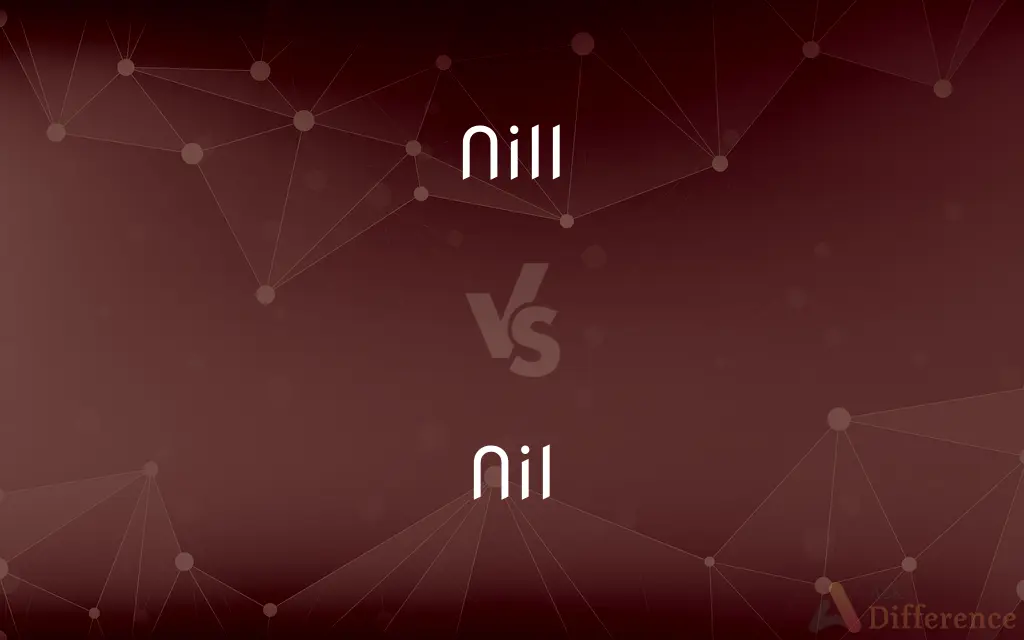Nill vs. Nil — What's the Difference?
By Tayyaba Rehman — Updated on September 4, 2023
Nill is an archaic verb meaning to be unwilling, while Nil refers to nothing or zero.

Difference Between Nill and Nil
Table of Contents
ADVERTISEMENT
Key Differences
Nill and Nil are both words in the English language, but they serve different purposes and meanings. Nill is an old and rarely used verb that indicates a refusal or unwillingness. On the other hand, Nil is a noun, typically signifying nothing, zero, or a lack of value.
In historical contexts, one might come across the term Nill, especially in older literature. Its usage has declined over time, making it quite archaic in modern English. Contrarily, Nil is a term still widely in use today, especially in sports, statistics, or accounting, indicating a score of zero or no existence.
Nill, owing to its limited and old-fashioned use, might not be familiar to many contemporary English speakers. If someone uses it in modern conversation or writing, it might lead to confusion. Meanwhile, Nil is universally understood, especially in contexts like soccer scores, to denote a tie where neither side has scored.
Grammatically, Nill is a verb, suggesting an action or state, specifically that of being unwilling. Nil is a noun, representing a concept or thing, specifically the absence of quantity or value. Both words have their roots in Old and Middle English but have diverged considerably in their modern relevance and application.
Comparison Chart
Part of Speech
Verb
Noun
ADVERTISEMENT
Meaning
To be unwilling or refuse
Zero or nothing
Usage
Archaic, rarely used in modern English
Common, especially in scores or stats
Origin
Middle English
Latin
Contextual Relevance
Seen in older literature
Seen in sports, business, etc.
Compare with Definitions
Nill
To disregard or ignore.
The council chose to nill the warning signs.
Nil
Zero or none.
The score remained at three to nil.
Nill
To show reluctance.
She nilled at the idea of trekking at night.
Nil
Lacking value or worth.
The contribution was considered to be nil.
Nill
To deny or disallow.
The king would nill the petition of the peasants.
Nil
Without results.
Despite efforts, the team's progress was nil.
Nill
To reject or refuse.
She would nill his advances at the ball.
Nil
Absent or non-existent.
The chances of success were nil.
Nill
Not to will; not to wish.
Nil
Null or void.
The contract was declared nil.
Nill
To be unwilling; will not (+ infinitive).
Nil
Nothing; zero.
Nill
To be unwilling.
Nil
Nothing; zero.
Nill
To reject, refuse, negate.
Nil
(sports) A score of zero
The football match ended in a nil-nil draw.
Nill
Shining sparks thrown off from melted brass.
Nil
No, not any.
Nill
Scales of hot iron from the forge.
Nil
Will not.
Nill
(obsolete) zinc oxide, particularly white forms used in medicine and cosmetics.
Nil
Nothing; of no account; worthless; - a term often used for canceling, in accounts or bookkeeping.
Nill
Not to will; to refuse; to reject.
Certes, said he, I nill thine offered grace.
Nil
A special value for a variable used in certain computer languages to mean no assigned value, to be distinguished from the value zero.
Nill
To be unwilling; to refuse to act.
The actions of the will are "velle" and "nolle," to will and nill.
Nil
A quantity of no importance;
It looked like nothing I had ever seen before
Reduced to nil all the work we had done
We racked up a pathetic goose egg
It was all for naught
I didn't hear zilch about it
Nill
Shining sparks thrown off from melted brass.
Nill
Scales of hot iron from the forge.
Common Curiosities
Is Nill commonly used in modern English?
No, Nill is considered old-fashioned and is rarely used today.
What does Nil represent?
Nil typically denotes zero or nothing.
Is Nil used in specific contexts?
Yes, it's often used in sports scores and statistics.
What does Nill mean?
Nill is an archaic verb meaning to be unwilling or to refuse.
Can Nill be used as a noun?
Traditionally, Nill is used as a verb.
Is Nil a universal term for zero?
In many contexts, yes, especially in British English.
Are Nill and Nil interchangeable?
No, they have different meanings and usages.
Where does the term Nill come from?
It originates from Middle English.
Which word is more relevant in everyday speech?
Nil is more commonly understood and used.
Can Nil be used in formal writing?
Yes, it's accepted in both formal and informal contexts.
Can Nil be used as a verb?
No, Nil is typically a noun.
Why might someone use Nill in writing?
Likely for poetic or historical reasons, given its archaic nature.
Are there synonyms for Nill?
Yes, like "refuse" or "reject."
Is it wrong to use Nill in contemporary writing?
Not wrong, but it may confuse modern readers unfamiliar with the term.
Do both words have Old or Middle English origins?
Yes, both words trace back to Old and Middle English.
Share Your Discovery

Previous Comparison
Allocentric vs. Idiocentric
Next Comparison
Oblige vs. ObligateAuthor Spotlight
Written by
Tayyaba RehmanTayyaba Rehman is a distinguished writer, currently serving as a primary contributor to askdifference.com. As a researcher in semantics and etymology, Tayyaba's passion for the complexity of languages and their distinctions has found a perfect home on the platform. Tayyaba delves into the intricacies of language, distinguishing between commonly confused words and phrases, thereby providing clarity for readers worldwide.














































